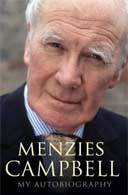
My Autobiography
by Menzies Campbell
Hodder & Stoughton £20, pp336
Why, you may wonder, is a Tory politician reviewing Ming Campbell's My Autobiography? Are the wounds too recent for a Lib Dem MP to be trusted? Is Ming fed up with the lot of them? I suspect it is because being a Lib Dem has always been only part of Campbell's public life. He is no conventional career politician, as is strikingly clear in his book. He remembers that as his 40th birthday approached: 'I wanted to become a judge ... rather than an MP. I was a lawyer first, a politician second.' At around the same age, David Cameron and Nick Clegg are leading their parties.
In a similar vein, the first chapter is not about either his birth or his political aspirations. The book opens with Ming as an Olympic athlete representing Britain at the Tokyo Olympics in 1964, when Clegg wasn't even born. The photograph he has chosen for the back of the dustcover is not of Campbell addressing his party conference but of Ming the athlete winning the 220 yards championship at White City in 1964. This guy has a past.
Throughout his political career, Campbell has been a loyal and professional Lib Dem. During his 19 months as leader, he may, as he clearly believes, have prepared them well for the next general election. But neither consideration explains why he is held in high regard by the public when most politicians are classed as somewhere between secondhand-car salesmen and expense-account spivs.
Campbell's reputation was neither enhanced nor damaged by his spell as leader. It had already been established by his forensic skills as his party's foreign and defence spokesman. In the Commons, on radio and constant appearances on Newsnight during the Iraq crisis, he sounded authoritative and wise. One could be forgiven for forgetting that he was not an ex-Foreign Secretary.
But if he is such a great statesman, respected and admired by the public, why did the Lib Dems dump him? Why did a cruel media lampoon him mercilessly? Campbell sums it up in a perceptive comment on Prime Minister's Questions: 'It's theatre, not debate. I'm uncomfortable with that kind of politics.' He was not only uncomfortable with it, he was also not very good at it. I was astonished in the first few weeks of his leadership that this distinguished and eloquent QC needed notes in order to ask the Prime Minister a couple of questions each Wednesday.
The problem was not a defective memory, but nerves and the point-scoring required on these occasions. That is true for all the party leaders all the time. Blair was brilliant at it, Cameron has become quite impressive, Gordon Brown is boring, and Ming, I fear, seemed dull. The public and the media express genuine scorn at the endless party battles. At the same time, Brown, Cameron and Campbell were being endlessly judged on those criteria rather than on their policy, wisdom or maturity.
In the last few months of his leadership, this 66-year-old ex-Olympic athlete was portrayed in the press as a doddering geriatric with constant references to Zimmer frames, bus passes and pensions. Such is the cult of youth today that this was seen as fair game and there was little Ming could do about it. It was absurd when judged against the national interest. Churchill and Harold Macmillan were both in their middle sixties when they first became Prime Minister and they didn't do too badly. The US may be about to elect a 71-year-old as its next President.
To be fair, the constant references to Campbell's age were not just about anno Domini. A perceptive article pointed out that his problem was that he appeared to be old-fashioned. He carries himself like a Guards officer and if he doesn't wear stiff collars any longer, he looks as if he might. Nobody cared, or cares, about Paddy Ashdown's age, though he is several years older than Campbell.
You may want to know whether, after all this, I am encouraging you to read the book. Half these memoirs are about the details of Lib Dem conferences, policies and speeches. It is deadly dull unless that is the sort of thing that turns you on. The rest is well worth the effort. The author confesses his failings as well as his successes. He writes more intimately about his friendship with John Smith and Donald Dewar than about party colleagues. He shows himself to have a splendid wife in Elspeth and a life before and, doubtless, after politics. One day, he may conclude that the Lib Dems did him a favour by dumping him.

